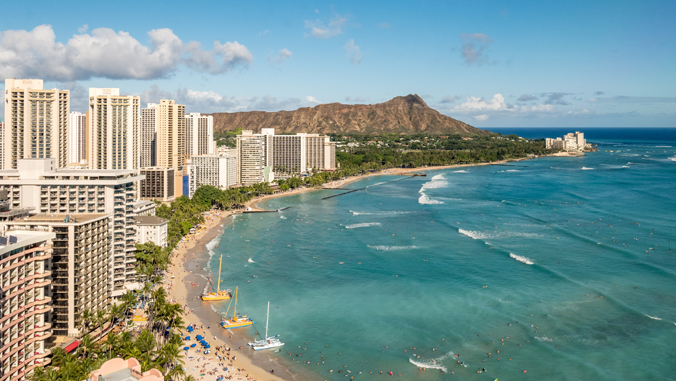
A majority of Hawaiʻi residents prefer limiting the number of visitors to the islands and support charging entry fees for visitors at parks or other “hot spots” during peak times. These are some of the results from a new survey about the visitor industry conducted by the University of Hawaiʻi at Mānoa’s Public Policy Center.
Other findings include residents supporting the state regulating tourism more than other businesses, using rental car surcharges to pay for addressing tourism impacts and creating a “permanent tourism advisory council system” to include resident and industry stakeholders.
“This is an important topic for our state right now as the tourism industry re-emerges from the COVID-19 pandemic,” said Colin Moore, director of the Public Policy Center. “I hope these results will lead to thoughtful conversations about how we can restructure tourism governance.”
A total of 700 Hawaiʻi residents completed the survey, which was administered online from April 16 to May 3, 2021. The Public Policy Center is housed in the College of Social Sciences.
Size of Hawaiʻi’s tourism market
Fifty-two percent of the respondents prefer limiting the number of visitors, with even stronger support among neighbor island and Native Hawaiian residents. Residents also prefer to see tourists charged and/or required to make advance reservations at parks or other “hot spots,” with 78% strongly favoring or somewhat favoring charging visitors an entry fee to use them during peak times.
Government actions
A strong consensus of residents feel the state should play a role in managing the tourism industry. Residents by a 2-to-1 margin said the state should control or regulate tourism more than other businesses. Support for regulating vacation rentals outside resort areas was almost 75%. A majority (52%) opposed allowing casino gambling in the state.
Tourism and COVID-19
Fifty-one percent of respondents rated the state’s performance to limit COVID-19 threats from travel as “fairly bad” and another 6% just “bad.” A plurality of 45% want both vaccination and testing requirements for travelers to and from Hawaiʻi and 67% want the quarantine requirements the same for all counties.
Given a choice on whether the state should focus on tourism recovery or economic diversification this year, residents want the state to focus on both equally (49%), but those choosing just one went strongly with diversification (37%) over tourism recovery (10%).
Values and principles
Respondents were most supportive of a visitor industry that improves rather than depletes natural and cultural resources (46% selection as “most important” in list); markets to respectful visitors (43%); and assures jobs that provide a living wage (43%). Also on the list were generating the most possible tax dollars (22%); growing tourist dollars rather than tourist numbers (21%); and avoiding actions that negatively affect Hawaiʻi’s image (19%).
Destination management
Many residents support using rental car surcharges to pay to address tourism impacts and favor green fees, which are visitor taxes specifically for natural resource protection. Results also showed that residents have diverse opinions about the Hawaiʻi Tourism Authority (HTA). A plurality of 35% would both keep the HTA and also increase its authority in destination management. A “permanent tourism advisory council system” including both resident and industry stakeholders won more than 2-to-1 approval among those with clear opinions (34% yes, 15% no), but a plurality of 45% said, “depends how it’s done.”
This work is an example of UH Mānoa’s goal of Excellence in Research: Advancing the Research and Creative Work Enterprise (PDF), one of four goals identified in the 2015–25 Strategic Plan (PDF), updated in December 2020.

